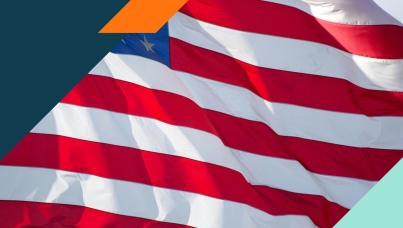Younger employed Americans are more concerned about AI replacing their jobs
Here’s what we know today from the Ipsos Consumer Tracker:
- We asked unmarried people if they want to be married and most of the 18-24 set (65%) want to be married vs. just 16% who say they don’t want to.
- And by taking out the IPAC questions, I don’t have a lot else to bullet so let’s just dive in, shall we?
- Oh, and you should really scroll to the bottom if you want AI to scare and impress you.
Read on for data about: AI, The Super Bowl, Customer Service chatbots, Valentine’s Day and more.
We had ChatGPT help us write more questions about AI in the workplace (and analyze the data, too)
Why we asked: ChatGPT, which just announced its starter monetization plan, continues to upend things in its brief life. It’s easy to see how some jobs could be easily modified and others rendered somewhat moot. But I say that as someone who thinks about this stuff a lot. What does America at large think? And once again, we prompted ChatGPT to help us draft these questions, which then went through rounds of refinement by well-trained humans, who are way more fun to work with.
What we found: When we asked employed people if AI would change their jobs in the next five years, 46% rated that as likely. There were big differences in age (62% of younger folks think it’s likely!) but there were no real differences based on college degrees.
Next, we changed the question up. What about being outright replaced or displaced by AI in the same five years? Again, there were big differences in age, with 46% of people saying it’s likely AI is coming for their jobs vs. 30% overall. But here we start to see some differences based on college education. Those without a college degree were much more likely (36% to 22%) to say that AI could replace their work. Further:
- Gender and age both seem to play a role in the perceived likelihood of AI replacing the job of the surveyed individuals. Men and people aged 18-34 were more likely to believe it is very likely for AI to replace their jobs, whereas women and those aged 55 and over were more likely to believe it is not likely.
- Household income also appears to be a factor, with those earning under $50,000 more likely to believe their job could be replaced by AI in the next 5 years, compared to those earning $100,000 or more.
- Political affiliation was also collected, but the data does not indicate a clear pattern.
- Overall, a plurality of employed individuals surveyed (34%) believe it is not at all likely that AI will replace their job in the next 5 years, while a minority (22%) believe it is somewhat likely and only 11% believe it is very likely.
And, by the way, I pasted the data into the AI and asked for an analysis. It wrote those five bullet points (which we then edited). I am 100% certain that AI will change the way I do my job in the next five years – if not five months.
![]()
![]()
What are people on social media saying about AI?
What we found: Synthesio, an Ipsos company, has been monitoring social media on the topic. Here’s what folks are saying: ChatGPT is sparking mostly positive conversations (21% positive sentiment, 10% negative sentiment). According to Synthesio AI (we have AI, too!), top phrases associated with positive sentiment include “make money” and “game changer.”
There’s a lot of conversation around “I hope ChatGPT stays free” [Narrator: It will not.] On the flip side of monetization, we ran Topic Modeling study on general ChatGPT conversations to see the top emerging themes and the Top cluster (generated and named by AI) was “Make money with ChatGPT.” So we want it to be free, but also something we can use to make money ourselves. We’ve met humans, so that tracks.
More broadly, how do we feel about AI?
Why we asked: Beyond worry about our own jobs, we wondered how we feel about AI in the context of society, and how we should react to it.
What we found: More disagree than agree with statements like “The potential benefits of AI, such as increased efficiency and productivity, outweigh the potential job loss, “AI will create new jobs and opportunities to make up for the jobs that are lost,” and “Increased use of AI will lead to more diversity and inclusion in the workforce.” But not by too much. Twice as many think (50% to 26%) more AI will lead to income inequality and polarization.
But the one thing a sizable majority (64%) agree on across demographics — including nearly identical numbers of strong Republicans and Democrats — is that the government should take action to address potential job loss.
![]()
And In other ways we’re worried about our jobs…
Why we asked: In our last wave we asked some questions about hybrid work. But with a small sample of high-profile tech bosses asking workers to come back to the office and others doing layoffs, we thought we’d see how secure people are feeling in their jobs. It seems reasonable to presume that there’s some correlation to how they feel about spending.
What we found: More than a third of workers are afraid that they will have to go back to the office more often. Even numbers are worried about having to work longer hours (39%) and losing shifts and having less work (41%). Further, one in three are worried that someone in their household will lose their job in the next six months. But what really worries folks? The U.S. defaulting on its debt (60%)!
![]()
And in other sorts of chatbots…
Why we asked: With all the attention being paid to ChatGPT (including by us) we thought we’d ask about a different kind of chatbot. The kind that more people use on a daily basis: your friend, the pop-up chatbot that handles basic customer service requests on a wide range of websites.
What we found: A majority (68%) have used one of these services including across all age ranges. Of those, there’s a 50/50 split in those who had their problems solved by the bot at least sometimes, and those who were rarely able to get their issues solved without a human agent. From there, the sentiment gets a little more unified. Only 35% say these chatbots are effective. 85% say humans need to solve their problems. 77% find these bots frustrating, and 88% prefer to talk to humans. But will these numbers change with better AI behind the bots in the future?
![]()
Here’s what America is planning for the Super Bowl
Why we asked: Um, because it’s February. Do we really need more of a reason?
What we found: The vast majority plan (74%) to watch the Super Bowl some fashion, even if it’s just highlights afterward (8% of those). A plurality (37%) plan to watch at home alone or with family. Most will drink either alcoholic (62%) or non-alcoholic (67%) beverages. One in three will get food delivered from an app. Half will just have it on in the background and one in five will only watch the halftime show. 19% will bet on a betting site an even more (34%) will place some informal bet like an office pool. About half are excited for the ads (46%) including 33% who say they are more excited for the ads than the game itself. About a quarter say they only watch if they care about the teams playing. Betting is less of a driver, with just 10% saying they only watch if they bet.
![]()
![]()
Here’s what Americans are planning for Valentine’s Day
Why we asked: As we work on our What the Future (Love) edition, it occurs to us that it’s Valentine’s Day. Which is celebrated with far less salsa than the Super Bowl, but is nonetheless commercial. How will be people demonstrate their love?
What we found: 36% don’t plan to celebrate, which is fewer people than don’t plan to watch the Super Bowl. Granted, this is reported plans so grain of salt, but that’s still something. 22% plan to buy a gift. 20% plan to buy a card, and the same number plan a romantic night at home. 19% plan to go out for a date. Only 3% plan to actively celebrate some sort of anti-Valentines’ Day.
Signals
Here’s what we’re reading this week that has us thinking about the future.
- An Arizona city cuts off a neighborhood’s water supply. (via WashPo)
- Wyoming lawmaker walks back EV ban. But is it too late? (via WashPo)
- Chinese Demographics (not Chinese Democracy) (via WashPo)
- Goncharov, the greatest movie that never was (via Tumblr or Buzzfeed)
*** So, I asked ChatGPT to write something in the style of “futurist Matt Carmichael” (so as not to confuse me with the young Irish sax phenom, among others). It wrote something that wasn’t half bad. Then I asked it what made it my style and it said, “the style of this article, inspired by futurist Matt Carmichael, is characterized by a focus on innovation and technology as driving forces in shaping the future of an industry. It highlights the potential for new and emerging technologies to bring about positive change and improvements in the field, while also considering the importance of sustainability and the need to address key challenges. This style of writing is forward-looking and optimistic, while also being grounded in data and research to support the predictions and insights offered.”
Which, if you read What the Future, is pretty much exactly the voice we’re going for.
For complete toplines for all waves, please see the full data and methodology.



